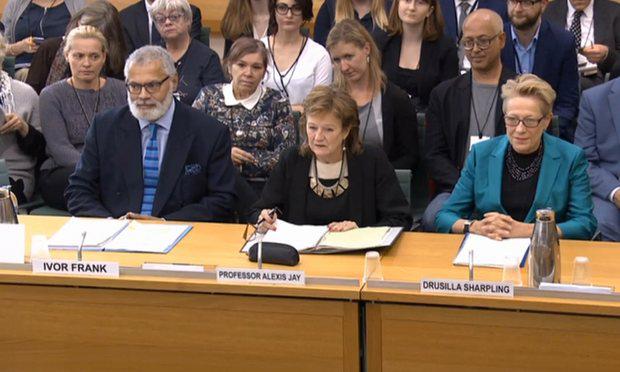|
Child abuse inquiry insider 'told Home Office about Goddard concerns in April'
By Sandra Laville And Haroon Siddique
Drusilla Sharpling tells MPs’ committee she alerted department to problems months before it says it was aware of them Serious concerns about the leadership of the chair of the national child abuse inquiry were taken to the top of the Home Office under Theresa May months before officials claimed they were aware of any reservations. It also emerged on Tuesday that relations between the leading panel members on the £100m inquiry and its chair, Dame Lowell Goddard – who was appointed by May in 2015 – were so bad that a professional facilitator was recruited to try to aid communications between them. May’s knowledge of the worries held by panel members about the leadership of the New Zealand judge she appointed came under intense scrutiny by MPs on the home affairs select committee on Tuesday. Dru Sharpling, a panel member, told the committee that she raised concerns about Goddard’s leadership with the director general of the Home Office in April this year – nine months after the panel began their work with Goddard. At the time, May – who set up the inquiry and as prime minister maintains a strong personal interest in it – was running the Home Office. But one of her officials – Mark Sedwill, permanent secretary to the Home Office – repeatedly denied that he or May were made aware of the Sharpling meeting with the Home Office official. He maintained that the first the Home Office knew of problems about the leadership of Goddard and the worsening relationship between the chair and her panel was on 29 July this year. Six days later, Goddard resigned, leaving the inquiry without a chair for the third time since it began in July 2014. Labour MP David Winnick accused Sedwill and the home secretary, Amber Rudd, of “shabbily misleading” the committee last month when giving evidence about Goddard’s departure. Rudd told MPs that Goddard had quit because she was a long way from home and was lonely. She made no mention of the Home Office being made aware of the panel’s concerns about the New Zealand judge in April this year. Sedwill said the home secretary had been responding to questions about Goddard’s motivation for leaving, and had not been aware of earlier concerns raised with officials. Neither he nor the then home secretary May had been made aware of Sharpling’s meeting with the director general, he said. In an at times defensive performance before MPs, the panel members said they were determined to carry out the remit of the inquiry and come up with robust recommendations to prevent children being abused within institutions in the future. Sharpling, responding to questions about the departure of Goddard, revealed that she had informed Mary Calam, the Home Office director general for the crime and policing group, on 26 April about the concerns with Goddard’s leadership. Responding to allegations reported in the media that Goddard was racist and abusive to staff on the inquiry, Sharpling said: “I am not going to engage in the sort of character issues that have been published across the papers. It seems to me to be entirely inappropriate. These are matters which are not something that ought to be played out in the public domain.” Professor Alexis Jay, the new chair of the inquiry, also refused to go into details about why the panel had difficulties with Goddard, except to say they had concerns about her “leadership and the progress of the inquiry”. Jay said Goddard had made it clear she wanted to work alone and had kept panel members at a distance. Giving evidence alongside Sharpling and inquiry panel member Ivor Frank, the trio refused to comment on the departure of three senior lawyers since Jay took up her position. These departures have included that of lead counsel Ben Emmerson QC. Jay said the inquiry had never been in crisis. “This inquiry has always been bigger than any single person,” she said. Frank revealed that the challenges in the relationship between the panel and Goddard were so great that a professional facilitator was hired in an attempt to improve the relationship. The panel members insisted that the turbulence had not impacted on the work of the inquiry and that there had been achievements, including the gathering of evidence in private from 200 individuals via the “truth project”. Despite criticism of her lack of legal expertise and background as a social worker, Jay said she believed she had the support of many victims and survivor groups, though she acknowledged that many were unhappy at her appointment. Jay said she had never in her life been accused of tolerating bullying or offensive behaviour but could not comment on the allegations in the press against Goddard. In correspondence published by the inquiry, Tim Loughton, the acting chair, made clear to Goddard that if she did not agree to give further evidence to the inquiry, either in person or via video link, she may be open to parliamentary censure. Loughton told the New Zealand judge in a letter dated 14 October: “I would just add that committee members have asked me to make clear that, if you are unwilling to comply with this further request to cooperate with our formal scrutiny role as a parliamentary select committee by giving oral evidence, we may well feel it necessary to draw this refusal to parliament’s attention in any report we produce on the recent events affecting the independent inquiry. That report would of course be published and the issue would then be a matter of public record.”
|
.
Any original material on these pages is copyright © BishopAccountability.org 2004. Reproduce freely with attribution.
